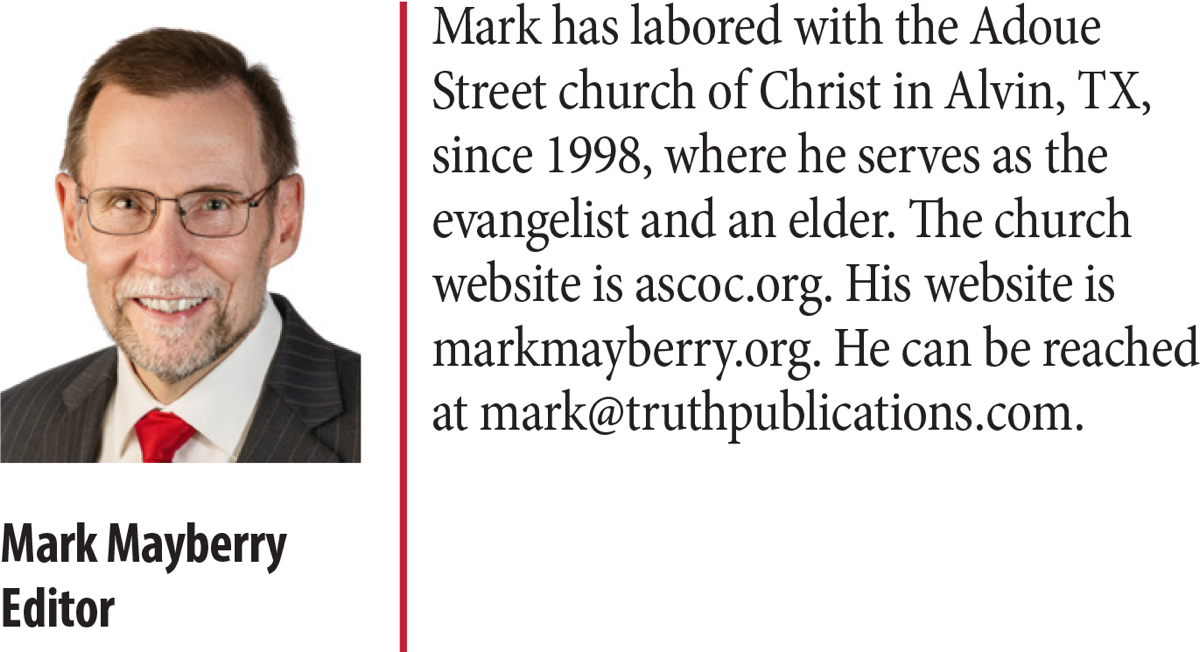By Mark Mayberry
Synopsis: The 2023-05 May issue of Truth Magazine focuses on “The Minor Prophets.” Specifically, it deals with those prophets who served God’s purposes between 845 BC and 745 BC. The remaining six will be addressed in a special issue later this fall.
What is a prophet? What is prophecy? What were the characteristics of a true prophet?
From a biblical standpoint, a prophet is a spokesmen for God, i.e., one who speaks by divine inspiration—accurately relating the past, addressing the present, and predicting the future. The Hebrew word nabi, occurring 314 times in the Old Testament, refers to “a spokesman, speaker, or prophet” (Thomas, 5030). According to the TWOT, “the essential idea in the word is that of an authorized spokesman” (Culver, 544). The Greek noun prophētēs, occurring 144 times in the New Testament, a compound of pro (before) and phēmi (to declare), refers to “a prophet (an interpreter or forth-teller of the divine will)” (Thomas, 4396). Louw and Nida define it as “one who proclaims inspired utterances on behalf of God” (53.79). Arndt says it signifies “a proclaimer or expounder of divine matters or concerns that could not ordinarily be known except by special revelation” and is specifically defined as “(1) a person inspired to proclaim or reveal divine will or purpose; or (2) by metonymy, the writings of prophets” (BDAG, 890-891).
The Greek verb prophēteuō, occurring twenty-eight times in the New Testament, means “to foretell, tell forth, prophesy” (Thomas, 4395). BDAG says it means “(1) to proclaim an inspired revelation or prophesy; (2) to tell about something that is hidden from view; (3) to foretell something that lies in the future” (BDAG, 890).
True prophets served as God’s mouthpiece, i.e., His spokesmen (Jer. 1:9-10; cf. Exod. 4:10-16; 6:28-7:2). The Holy Spirit inspired true prophets to communicated heaven’s message to humanity. David, the sweet psalmist of Israel, declared, “The Spirit of the LORD spoke by me, and His word was on my tongue” (2 Sam. 23:1-2). In delivering the plans of the temple complex to Solomon, “All this,” said David, “the LORD made me understand in writing by His hand upon me, all the details of this pattern” (1 Chron. 28:11-19, esp. v. 19). Describing the prophetic word as a lamp shining in a dark place, Peter said, “no prophecy of Scripture is a matter of one’s own interpretation, for no prophecy was ever made by an act of human will, but men moved by the Holy Spirit spoke from God” (2 Pet. 1:19-21).
True prophets accurately related the past, addressed the needs of the present, and offered precise predictions of the future (Isa. 41:21-29; 42:5-9; 43:8-13). The apostles of Christ were similarly gifted (John 14:25-26; 16:12-14; 1 Tim. 4:1-3).
True prophets communicated God’s will by various means and measures—through dreams, visions, and dark sayings, and also directly and openly (Num. 12:1-8; Joel 2:28-29; Matt. 17:1-8; Heb. 1:1-4).
True prophets enjoy a divine commission, proclaiming the message that God entrusted them to deliver (2 Sam. 7:1-7; Jer. 1:4-10; Ezek. 1:1-3). In the NASB, the expression, “the word of the Lord came to. . .” occurs eighty-three times in the Old Testament.
Whether foretelling the future, concentrating on current circumstances, or pondering the past, true prophets proclaim a message that is consistent with the rest of divine revelation (Deut. 13:1-5; 18:20-22; Isa. 8:19-20).
True prophets present a complete message, proclaiming all that God commanded, omitting not a word (Jer. 1:17-19; 26:1-6; 42:4-6).
True prophets offer a corrective message, destroying and overthrowing all that is evil, building and planting that which is good (Jer. 1:9-10; 25:4-7; 44:4-6).
When opposed by sinful men, true prophets do not cower in fear but courageously communicate God’s word to commoners and kings (Ezek. 2:1-7; 3:4-11; Mic. 3:5-8).
The Bible contains many noble examples of those who served as prophets: Abraham (Gen. 20:7), Moses (Deut. 34:10-12), Samuel (1 Sam. 3:19-21), Saul (1 Sam. 10:5-6, 10-12; 19:23-24), Gad (1 Sam. 22:5; 2 Sam. 24:11), Nathan (2 Sam. 7:2; 12:25; 1 Kings 1:8, 10, 22-23, 32, 34, 38, 44-45), Ahijah the Shilonite (1 Kings 11:29; 14:2, 18), Jehu (1 Kings 16:7, 12), Elijah (1 Kings 18:22, 36), Elisha (1 Kings 19:16; 2 Kings 3:11), Micaiah (1 Kings 22: 7-8, 13), Jonah (2 Kings 14:25), Isaiah (2 Kings 19:2), Shemaiah (2 Chron. 12:5), Iddo (2 Chron. 13:22), Oded (2 Chron. 15:8), Jeremiah (2 Chron. 36:12), Haggai (Ezra 5:1-2), along with the sons of the prophets (2 Kings 2:5, etc.), and various other unnamed individuals (1 Kings 18:3-4, 13; 20:13, 22).
However, Jesus Christ is the greatest example of one who holds the prophetic office: “God, after He spoke long ago to the fathers in the prophets in many portions and in many ways, in these last days has spoken to us in His Son, whom He appointed heir of all things, through whom also He made the world” (Heb. 1:1-2).
His position is unparalleled and His authority is absolute (Deut. 18:15-19; Acts 3:17-26). Not only is Jesus the central focus of prophecy (Gen. 3:15; 12:3; 49:10; etc.), as an eternal member of the Triune Godhead and the Incarnate Word, He is the central source of prophecy (John 1:14-18; Heb. 1:1-2).
The Lord Jesus Christ is the One whom Moses foreshadowed:
The Lord your God will raise up for you a prophet like me from among you, from your countrymen, you shall listen to him. This is according to all that you asked of the Lord your God in Horeb on the day of the assembly, saying, “Let me not hear again the voice of the Lord my God, let me not see this great fire anymore, or I will die.” The Lord said to me, “They have spoken well. I will raise up a prophet from among their countrymen like you, and I will put My words in his mouth, and he shall speak to them all that I command him. It shall come about that whoever will not listen to My words which he shall speak in My name, I Myself will require it of him” (Deut. 18:15-19).
In his second sermon recorded in Acts, Peter declared that Jesus is the Seed of Abraham and the Prophet whom God would raise up in the period of restoration. Utter destruction will befall those who refuse to heed His message, while abundant blessings belong to all who turn from their wicked ways:
Therefore, repent and return, so that your sins may be wiped away, in order that times of refreshing may come from the presence of the Lord; and that He may send Jesus, the Christ appointed for you, whom heaven must receive until the period of restoration of all things about which God spoke by the mouth of His holy prophets from ancient time. Moses said, “The Lord God will raise up for you a prophet like me from your brethren; to Him you shall give heed to everything He says to you. And it will be that every soul that does not heed that prophet shall be utterly destroyed from among the people.” And likewise, all the prophets who have spoken, from Samuel and his successors onward, also announced these days. It is you who are the sons of the prophets and of the covenant which God made with your fathers, saying to Abraham, “And in your seed all the families of the earth shall be blessed.” For you first, God raised up His Servant and sent Him to bless you by turning every one of you from your wicked ways (Acts 3:19-26).
True prophets were persecuted (2 Chron. 36:15-16; Matt. 5:11-12; Acts 7:52; Heb. 11:32-40; Jas. 5:10).
True prophets were threatened (2 Chron. 25:15-16; Jer. 26:7-8).
True prophets were mistreated (Jer. 37:21; 38:6, 9).
True prophets were beaten (Jer. 20:1-2).
True prophets were arrested (Jer. 37:13-14).
True prophets were imprisoned (1 Kings 22:26-28; 2 Chron. 16:10; Jer. 32:2-3).
True prophets were killed (1 Kings 19:10, 14; 2 Kings 9:7; 2 Chron. 24:20-21; Neh. 9:26; Matt. 23:37).
Like the true prophets of old, we must willingly endure affliction for the cause of Christ (Heb. 11:32-40; Jas. 5:10-11).
In both the Old and New Testaments, false prophets fall under consistent condemnation (Ezek. 13; Matt. 7:15-20). They may be temporarily popular but are terminally ineffective:
An appalling and horrible thing has happened in the land: The prophets prophesy falsely, and the priests rule on their own authority; and My people love it so! But what will you do at the end of it? (Jer. 5:30-31).
“Behold, I am against those who have prophesied false dreams,” declares the LORD, “and related them and led My people astray by their falsehoods and reckless boasting; yet I did not send them or command them, nor do they furnish this people the slightest benefit,” declares the LORD (Jer. 23:26-32).
False teachers/prophets display the following deficiencies: (1) They make a false claim to inspiration (Jer. 23:16-22; 27:14-15; 29:8-9). (2) They evidence falseness of character (Jer. 6:13-15; 23:11-15; Isa. 28:7-8; 56:9-12). (3) They proclaim a message with false content (Jer. 14:13-15; 23:25-32; Lam. 2:13-14). Sometimes, these shortcomings are obvious. Sometimes the picture is muddled.
What about the prophets of Baal and the Asherah? Their claim, character and content were all false. As a result, the sentence of death fell upon them and their followers (Jer. 2:7-8; 23:13-15; 1 Kings 18:17-20, 40).
What about Balaam, the son of Beor? Balaam was indeed a vehicle through whom Jehovah occasionally spoke (Num. 22:1-21; etc.). While his character was false (2 Pet. 2:15-16; Jude 11), the content of his public proclamations was true (Num. 23:7-10; etc.). Yet, his private counsel to King Balak contradicted God’s pattern of morality (Num. 25:1-3; 31:15-16; Rev. 2:14-16). The consequence of his counsel brought death and destruction to all involved (Num. 25:1-9; 31:7-17).
What about the old prophet from Bethel? His claim to the prophetic office was true, his character/motivation is “complicated” (he respected the young prophet but lacked personal honesty), but the content of his message was false. The consequences of his message brought death to the young prophet who heeded his words (1 Kings 13).
In summary, note the differences in the aforementioned examples regarding claim, character, and content. However, the consistent marks of a false prophet involve content and consequences. A false prophet is one who promotes false doctrine that results in spiritual death.
While the prophetic office is now historic (1 Cor. 13:8-10; Jas. 1:25), the message of those who spoke by inspiration is preserved in the pages of Holy Scripture (Eph. 3:1-5; 4:11-16). Let us remember, revere, and obediently respond to the inspired message:
So we have the prophetic word made more sure, to which you do well to pay attention as to a lamp shining in a dark place, until the day dawns and the morning star arises in your hearts. But know this first of all, that no prophecy of Scripture is a matter of one’s own interpretation, for no prophecy was ever made by an act of human will, but men moved by the Holy Spirit spoke from God (2 Pet. 1:19-21).
This is now, beloved, the second letter I am writing to you in which I am stirring up your sincere mind by way of reminder, that you should remember the words spoken beforehand by the holy prophets and the commandment of the Lord and Savior spoken by your apostles (2 Pet. 3:1-2).
Genuine disciples will study to show themselves approved unto God (2 Tim. 2:15), and will faithfully preach the word, reproving, rebuking, exhorting, with patience and instruction (2 Tim. 4:1-5). Truth may be proclaimed sincerely or in pretense (Phil. 1:15-18). Error may be promoted through ignorance (Matt. 7:21-23) or malice (Acts 13:6-10). May we recognize that the preaching of truth liberates (John 8:31-32) while the proclamation of error enslaves (2 Pet. 2:1-3).
Let us, therefore, guard against those who would speak perverse things, and remain ever committed to the word of Christ (Acts 20:28-32). Unfortunately, many today want a soft, self-serving message like King Ahab (1 Kings 22:1-40), and the Israelites of old (Isa. 30:9-17). Do not be led astray by false prophets, whose message is rooted in the lust of the flesh, the lust of the eyes, and the pride of life. Listen to the voice of God’s prophets, whose message is preserved in the pages of Sacred Scripture. Above all, be attentive and obedient to Jesus Christ, the Prophet who stands supreme above all others, and who will judge the world in righteousness on that final day.
Arndt, William, et al. A Greek-English Lexicon of the New Testament and Other Early Christian Literature. Chicago, IL: University of Chicago Press, 2000.
Culver, Robert D. “Prophet” in Theological Wordbook of the Old Testament (TWOT), ed. by R. Laird Harris, Gleason L. Archer Jr., and Bruce K. Waltke. Chicago: Moody Press, 1999.
Louw, Johannes P. and Eugene Albert Nida. Greek-English Lexicon of the New Testament: Based on Semantic Domains. New York: United Bible Societies, 1996.
Thomas, Robert L. New American Standard Hebrew-Aramaic and Greek Dictionaries: Updated Edition. Anaheim, CA: Foundation Publications, Inc., 1998.


